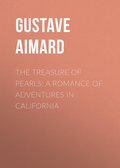
Gustave Aimard
The Queen of the Savannah: A Story of the Mexican War
The cause of the Stag's sudden departure was simple. Informed by the warriors who met him of the events which had occurred during his absence, his first care was to go to the Indian whom Doña Emilia had disfigured. The unhappy man was in a pitiable state; he was writhing in fearful agony, and uttering heart-rending cries.
"Is my brother suffering greatly?" the chief asked him.
"Yes," the injured man howled. "I am suffering horrible pain. That woman is most certainly the evil genius of our nation."
"Yes, but her hour has arrived; her punishment will soon begin."
"Oh, I should like torture resembling mine to be inflicted on her."
"She shall suffer a hundredfold more. My brother's tortures are as nothing compared with those I reserve for her. Is my brother satisfied?"
"Yes, I am glad to know that I shall be avenged."
"Is my brother still suffering greatly?"
"More than ever. If honour did not forbid a warrior killing himself, I should have already buried my knife in my heart."
"Good! What my brother cannot do I can, to render him a service."
"Will the chief consent to do me that service?" the Indian asked doubtfully.
"Yes, to be agreeable to my brother, whom I love, I would consent."
"Oh! In that case the chief must not delay, for my agony is becoming more and more unendurable."
"Be it so; let my brother prepare."
"Stay," the Indian remarked, "help me to rise. A Comanche warrior must die standing."
"That is true," the chief answered.
He bent over the warrior, seized his arm, and helped him to get on his feet. By an extraordinary effort of will the Indian succeeded in overcoming his pain. He drew himself up proudly, and turned to the chief.
"Strike," he said in a firm voice, "and may the Wacondah protect you for the service you are doing me at this moment."
The Stag drew his knife, and plunged it into the warrior's heart. The blow was dealt with such certainty and skill that the redskin fell dead at his chief's feet without a sigh.
"Poor wretch!" the latter muttered sadly, as he wiped his knife blade on a tuft of grass, and returned it to his belt. "I could not refuse him this service." After this melancholy funeral speech the Stag began digging a hole, in which to lay his comrade's body, as he did not wish to leave it exposed to the insults of wild beasts. The last duty accomplished, he went down the hill to rejoin his captives.
In the meanwhile the Indians had fled in all directions, suffering from a panic produced by Doña Emilia's energetic action, but the two warriors sent by the Stag in pursuit of them soon caught them up. It took considerable time, however, before they succeeded in making them consent to turn back, and enter again the presence of a woman whom they regarded as an evil genius. It required all the diplomatic skill of the chief's emissaries to convince them, combined with the influence which the son of Running Water, the most revered sachem of the tribe, had over them. When the young chief joined the captives, the warriors were already mounted, and drawn up a short distance off, only awaiting his return. The latter saluted them with a wave of the hand, and then ordered the bridles of the two horses to be removed, after which he went up to Doña Emilia, and pointed to the animals.
"Mount," was all he said.
This order must be obeyed.
"My daughter and I will ride the same horse," she remarked. "My daughter is weak, and I will support her."
"Be it so," said the chief.
Doña Emilia mounted, placed her daughter in front of her, and holding her tightly to her bosom, made her horse start without awaiting the chief's signal. The Comanche smiled, and followed her with his detachment. Doña Emilia, though a captive, seemed still to command these men, who regarded her with superstitious terror.
CHAPTER XXVII.
THE CHIEF'S PROPOSAL
Ordinarily Indians do not travel by night, and it required circumstances imperious as the present for the chief to resolve thus to infringe the customs of the redskins. In truth, Don Melchior's flight caused him great anxiety about the success of his expedition, and he was anxious to cross the Indian border, as he felt persuaded that once he had passed the river which served as the limit of the Spanish possessions, and trod his native heath in a country all whose hiding places were familiar to him, he would be comparatively safe from the pursuit which would not fail to be begun so soon as the abduction of the two ladies was known, and that would not be long first if, as he feared, Don Melchior had succeeded in escaping.
The Indians galloped the whole night through in the direction of the river, whose yellow waters at length became visible at sunrise. Without even stopping to breathe the horses, tired by so long a gallop along difficult and scarcely marked tracks, the chief ordered his warriors to ford the river immediately.
During the whole of the sad night, which seemed as if it would never end, Doña Emilia held to her bosom the head of her daughter, who was crushed by so much emotion and terror. Not for an instant did the courage of this extraordinary woman and true mother fail her. Not for a second did her noble character break down. She remained ever calm and impassive, not uttering a word of complaint, or showing the fatigue that overpowered her. The very Indians, who are such connoisseurs of courage, could not refrain from secretly admiring this firmness of mind and perfect self-denial.
Although the river was very wide at the spot where the redskins forded it, it was crossed without accident, and the Comanches at length found themselves on Indian territory. The detachment, however, did not halt; for the distance that separated them from the white men was not yet sufficiently great for the Stag. He led his warriors to a forest about four or five leagues off, whose tall trees formed a belt of foliage on the horizon. During the whole journey the chief constantly galloped at the head of the detachment, not appearing to trouble himself in any way about his prisoners, though the deep wrinkles that furrowed his brow and his constant frown might have led to the supposition that this indifference was feigned, and that he was thinking out some bold plan.
At about two in the afternoon the little band reached the outskirts of the forest, and boldly rode beneath its covert. The journey then became more difficult, and, before all, more fatiguing, through the roots, shrubs, and lianas which at each instant barred the passage, and which the horses could only clear with the utmost difficulty.
The Stag, however, without neglecting entirely the precautions employed by the Indians when they are on the war trail, in order to throw out their enemies, felt so certain, however, that the white men would not venture into the formidable solitudes of Apacheria, owing to the innumerable obstacles which would rise at each step before them, and, above all, through their ignorance of the topography of this country, the last lurking place of the Indian braves, that he wasted but little time in masking his trail, and continued to advance almost in a straight line.
After marching thus for about two hours, crossing ravines and scaling hills, they reached a completely unwooded spot, over which were scattered shapeless ruins, proving that at a doubtless extremely remote period the place had been inhabited. These ruins, spread over a very considerable space, preserved a certain degree of symmetry; the walls, still standing, showed by their thickness and the care with which they were built, as well as materials employed, that an important town must have stood here once on a time. In the centre stood a teocali which time had respected, on the top of which were the ruins of a temple, whose vast and massive proportions testified to its ancient splendour, which was now eternally fled. There was something at once gloomy and majestic in the sight of these ruins suddenly rising in the midst of a virgin forest. They were the last traces of a forgotten world, whose memory the present inhabitants of the country have lost, and trample on their dust with a careless foot.
The Stag had selected these ruins to camp in. The warriors therefore established themselves in this city, probably founded by the Chichimecs at the period when, compelled by the hand of God, they performed their great migration, building in the course of their mysterious halts those formidable cities whose imposing ruins are still visible in different parts of New Spain. The Comanches during their vagabond rambles about the desert had many times camped at this solitary spot, whose strong position offered them a shelter against the attacks of their numerous enemies, men and wild beasts, that incessantly prowl about in search of a facile prey. It was at the summit of the teocali, in the ruins of the temple, which had heard the death cries of many victims offered as a holocaust to the implacable and sanguinary Hiutzilopochtli, the god of war, that the chief resolved to establish his camp.
When the horses had been hobbled in an excavation at the foot of the teocali, the warriors placed the prisoners in their midst, scaled the bramble and cactus covered steps that led to the top of the artificial hill, and on reaching the temple, after lighting several fires to prepare their meal, they cut down a quantity of branches, which they intertwined so as to form a species of roof over one of the halls of the temple. There, at a signal from the chief, the two ladies were installed, who, however precarious this shelter might be, were glad to take refuge in it, and escape for awhile from the stern glances of their ferocious conquerors, and recover from the terrible shock they had endured.
Doña Emilia's first care so soon as she was alone with her daughter, whose weakness was extreme, was to lay her on a pile of furs which the chief, doubtless through a feeling of compassion, had ordered to be placed by the fire. The state in which the young lady was, was really alarming. The prostration which had fallen on her after the snare to which she had fallen victim, was succeeded by a violent fever mingled with delirious and nervous attacks, which not only threatened her reason, but caused apprehensions for her life; at any rate there was reason to fear that her health would never entirely recover from the shock given to her system by the terror she had felt, and the extraordinary fatigue she had endured during nearly twenty hours; in spite of the sort of brutal gallantry with which the chief had tried to come to her help by ordering his men not to hurry, and by trying not only to pay the captives the attentions of which his rough character was capable, but by giving them all the relief he was able to offer them under the circumstances.
Doña Emilia did not know what means she should employ to calm her daughter's terrifying nervous excitement. Alone among savages, whom she justly regarded as implacable foes, wanting the remedies which were necessary for her poor child, she could only groan and hold her to her heart to prevent her dashing her head against the wall in one of these nervous attacks. Doña Emilia passed the whole night without sleep, constantly watching over the girl whose madness had assumed a startling character, and who no longer recognizing her mother, and unconscious of the place where she was, made the strangest remarks to her, and asked her the most singular questions with that volubility which fever produces.
Toward the close of night, at the moment when the stars began to disappear, the girl's frenzy gradually diminished; she closed her eyes and fell into a sleep which restored her poor mother a little hope and courage. At sunrise an Indian came in, placed provisions on the ground, laid a packet of simples by Doña Emilia's side, and withdrew without uttering a word. Several hours elapsed in this way; the redskins, while attentively watching their captives, left them constantly alone, supplying them all they required with a species of affectionate eagerness, but not troubling them with indiscreet questions or disagreeable intrusions into the refuge given them. Since their arrival at the teocali the chief had not presented himself to them, but seemed, on the contrary, desirous to remain invisible, while paying them attentions which revealed an assiduous care on his part.
Doña Diana's condition had visibly improved, nature, youth, and her powerful constitution had, after a trying struggle, eventually triumphed over the disease. Nursed by her mother with attentive tenderness, she at length became convalescent; but with health sorrow re-entered her mind, and the frightful position in which fatality had placed her appeared in all its horrible reality. She did not dare reflect on the future, for, alas, that was perhaps a terrible death amid torture, or dishonour a hundredfold worse than death. Hence a gloomy sorrow took possession of the maiden. She spent her days leaning over the wall, and with her eyes fixed on the imposing landscape that surrounded her looked despairingly around her, while burning tears, which she did not even think of drying, coursed slowly down her pale, thinned cheeks.
Mother and daughter remained thus side by side, not daring to confide to each other their terrible thoughts, awaiting the coming catastrophe which it was impossible for them to foresee or avoid. Days thus succeeded days without producing any change in their position; nothing had revealed to them the fate which the Comanches reserved for them, when on the morning of the tenth day after their arrival at the teocali, the Indian who seemed specially told off to watch them and supply them with food, informed them that the chief had arrived on the previous evening at the teocali, on his return from a distant expedition he had been obliged to make, and asked permission to speak to them after breakfast. On hearing this request, which was, however, made very politely, Doña Diana turned pale and shuddered with horror; she understood that her fate would depend on this interview, and spite of herself she trembled. Doña Emilia smiled ironically.
"Why pretend such great courtesy to captives?" she replied bitterly. "Is not your chief our master? As far as I am aware a master does not require to announce his coming to his slaves."
"The sachem ordered his warrior to speak as he has done," the Indian made answer. "The warrior has obeyed; my mother must not be angry with him."
"I am not angry with you, Indian," she said, less rudely, desiring not to alienate this man, who, ever since he served them, had displayed a species of rough pity. "I do not at all think of making you responsible for orders which you must neither discuss nor hesitate to carry out; still I will remark to you that as we are the prisoners of your sachem, as you term him, we have no means to avoid the interview he requests, and that, consequently, it is unnecessary for him to ask a permission which he can very well do without."
"Good! My mother speaks well; hence the sachem may come after breakfast?"
"He can come when he thinks proper. We will receive him, as he desires it."
The Indian went out, and the two ladies were left alone. "We are going to know our fate at last," Doña Emilia said, with a feigned indifference she was far from feeling.
"Yes," her daughter replied sorrowfully. "Heaven grant that a feeling of pity may still reside in the heart of this savage, and that the propositions he makes us may not be of such a nature that we must decline them."
"Heaven grant it, indeed, my daughter! Alas, who knows what fate reserves for us! Perhaps you will regret that you did not die during your illness." The girl remained silent for a moment, and then a gloomy smile played round her pale lips.
"Mother," she asked, "have you kept your vial?"
"Yes," Doña Emilia answered; "it still contains enough to kill us both."
"In that case rejoice, mother," the maiden answered, almost gaily, "we have nothing more to fear! Whatever proposition this crafty chief may make to us, we are always certain of getting out of his clutches, and finding refuge in death."
"It is well, daughter!" Doña Emilia replied, as she took Diana in her arms, and pressed her passionately to her heart.
So great is the effect that a powerful resolution always produces, that the two ladies awaited the chief's coming more calmly than they had hoped. They had scarce finished breakfast ere he appeared. The majordomo had, for this interview, doffed his Indian dress, and resumed that of the Mexican campesinos. This change denoted a resolution formed that he would allow no consideration to stop him. On recognizing him the two ladies uttered a cry, of surprise on the part of Diana, but of terror on that of her mother. She had discovered what she long suspected, that is to say, that her husband's majordomo was a traitor. On entering, he bowed to the ladies with ironical politeness; his face was smiling, his manner firm, and his voice coaxing.
"I venture to hope, señoras," he said, "that you will pardon a poor Indian."
"Oh," Doña Emilia said bitterly, "what a viper we have cherished!"
"Alas! Madam," he answered lightly, "why employ such ugly epithets? Everybody in this world is obliged to bow before necessity. It was not, be assured, of my own accord that I have so long remained a stranger to you."
"You are, then, really the chief of the men who carried us off, and it was you probably who prepared the odious snare into which we fell?"
"I will not attempt to deny it, madam," he said.
"What harm have I done you, who have been, living for more than twenty years beneath my roof, where you were taken in through charity; you whom my husband loves and places entire confidence in?"
"A confidence which I still possess, madam. But why lose our time in vain discussions? The open step I have taken must prove to you that my mind is irrevocably made up, and that I shall not hesitate or recoil in the execution of the plan I have formed."
"What you are doing is horrible; you requite with the blackest ingratitude the kindness with which my family has overwhelmed you."
"That is the very word, madam," he said, with a bitter smile; "but in order to cut short useless recriminations, and lay down the question distinctly, let me make a confession which will establish our position to each other."
"Speak, speak! What frightful revelation have you to make to me?"
"I, madam," he replied, drawing himself up majestically, and fixing on her a fiendish glance, "am the son of Running Water, the Chief of the tribe of Red Buffaloes, whom your family so cowardly and obstinately hunted down. Do you now understand why I hate you, and why you are here?"
"Oh!" she shrieked, clasping her hands in despair, "We are lost."
Doña Diana was annihilated; she fancied it was all a fearful dream.
"No, madam," he replied in his calm and metallic voice, "your safety is in your own hands."
"My safety?" she asked ironically.
"Yes, madam, your safety. You are really conscious of the situation in which you are, I assume? You are thoroughly convinced that you are in my power, and that no human help can save you?"
"Yes, but God remains – God, who sees, and will save us," she exclaimed fervently, "God who will foil your odious machinations!"
"God!" he said, with a hoarse laugh. "You forget, madam, that I am a Comanche, and that your God is not mine. Bow your head before the fatality that crushes you. Your God, if He exist, is powerless against me. I deride his power!"
"Silence, blasphemer! The God you dare to defy can, if He pleases, crush you in a moment."
"Let Him do so then, and I will believe in Him." And he raised his head and looked up defiantly at the heavens. "But, no," he added a moment after, "all these things are falsehoods invented by the priests to hold men in awe. You are here in my power, I repeat, and no power, human or divine, will liberate you; but, as I said, it is easy for you to leave this place in freedom within an hour, if you please."
"After insult, mockery, that is the right way," she said contemptuously.
"I am no more mocking you now than I insulted you before; I am speaking frankly, and offering you an honourable bargain, which you can accept or refuse as you please."
"A bargain," she murmured in a hollow voice.
"Yes," he continued, "a bargain; and why not? Listen to me. I hate your family, madam, with all the hatred that a human heart can hold; but you personally never offended me, and I have, therefore, no reason to wish you harm. Then, there is another thing which pleads in your favour; why should I conceal it any longer? I love your daughter."
"Villain!" Doña Emilia exclaimed, as she rose and walked toward him.
Doña Diana threw herself wildly into her mother's arms, and buried her face in her hands, crying desperately.
"Mother, mother, save me!"
"Fear nothing, daughter," she replied; "this man can insult us, but he will never succeed in humiliating us to his own level."
The Indian listened to these words without a muscle of his face quivering.
"I expected this outburst," he said calmly; "but you will reflect; I repeat that I love your daughter, and intend her to be mine."
"Never," the two ladies exclaimed desperately.
"At that price alone," he continued stoically, "you will be free; if not, prepare for death."
"Yes, yes," Doña Emilia burst forth passionately, "yes, we will die, but both by our own will. Ah! You feel very certain of the success of your odious plot, but you have calculated badly, villain; the death with which you threaten us, we invoke as the supreme refuge left us. You are masters of our life, but not of our death. We defy you."
The Indian burst into a laugh.
"Look at your vial," he said, in his calm, cutting tone, "it no longer contains any acid. Yesterday some harmless soporifics were mixed with your food, and, during your sleep, you were robbed of the formidable weapon in which you had trusted rather too prematurely. Believe me, madam, you had better yield. I give you eight days to reflect; it would be easy for me to carry off your daughter, but I prefer receiving her voluntarily from you."
He accompanied these remarks with a mocking laugh, and left the room, without waiting for an answer, which the two unhappy women could not have given him, so annihilated were they by the frightful revelation which had just been made to them.







